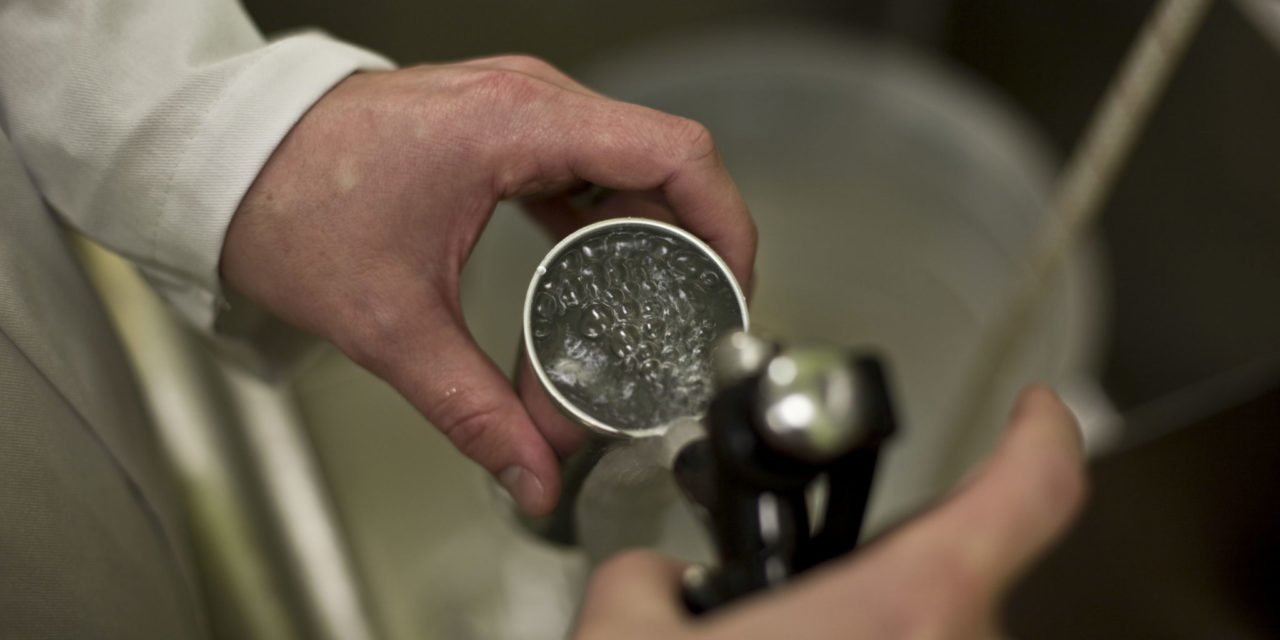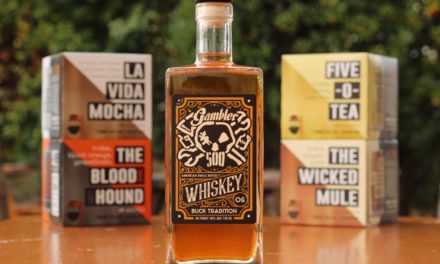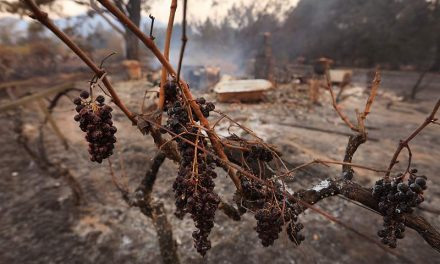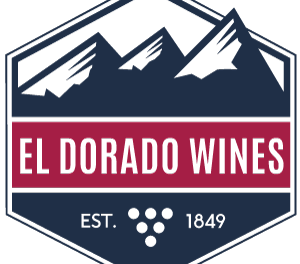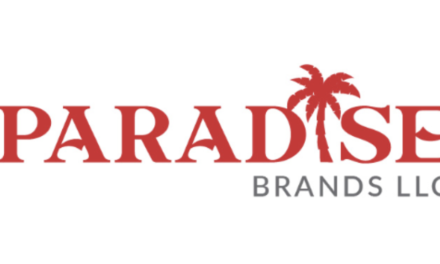When Jenny and Jeff Pennington, founders of Nashville-based Pennington Distilling Co., set out to create a Tennessee version of an Irish Crème, they knew the process wouldn’t be simple. First, they needed to figure out what they wanted it to taste like. With this in mind, they recruited a local chef to mix up several versions of the product using Pennington’s Tennessee whiskey. Once they determined their target flavor profile, they did what many American spirits producers do: They reached out to a flavoring company—in this case, Mother Murphy’s in Greensboro, N.C. Twenty-five flavor samples later, they had a winner.
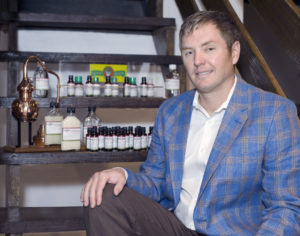
“They may know how to distill or how to blend different types of rum, but they don’t know how to make a finished, flavored product.” —Al Murphy, Mother Murphy’s [Photo courtesy Mother Murphy’s]
The resulting drink, Whisper Creek Tennessee Sipping Cream, has notes of caramel, red apple, fig and pecan—a complex flavor profile Pennington probably wouldn’t have been able to achieve on its own.
According to Al Murphy, vice president and alcohol specialist at Mother Murphy’s, which started out as a food and beverage flavoring business in 1946, the development process for even simple products is more involved than most people imagine. Creating a mango vodka, for example, isn’t just a matter of blending a standard mango flavor into a spirits base.
“The customer needs to specify what type of mango profile they are trying to simulate. If we can get more flavor descriptors from them, the better on target. We have a Philippine mango profile, peach-mango profile, and many other mango varietals,” he explains. “Also if they’re requesting an apple flavor, are they looking to simulate a green apple? Red Delicious? Macintosh? Gala?”
To help clients narrow down the choices, Murphy asks for a target flavor profile. “We will then send a sample that matches that profile. If we don’t have a flavor profile that meets the requirement, then we will create one.” Once a customer has nailed down their ideal flavor, Mother Murphy’s sends it to the client in liquid concentrate form. “[Clients then] take the flavor or flavors we give them, and they’ll add sugar, citric acid, salt—or whatever they’re doing to their spirits base—with water. Then they’ll proof it out to the flavor percentage they want in that particular base,” says Murphy.
Large spirits companies typically have research-and-development departments that understand formulating a beverage product with flavors, but entrepreneurs and micro-distillers often need help with that aspect of formulation. “They may know how to distill or how to blend different types of rum, but they don’t know how to make a finished, flavored product,” Murphy says. “In those cases, I’ll bring people to the table to help them out. I have developed a variety of relationships in the industry that can help companies create flavored alcohol brands.”
Starting from scratch
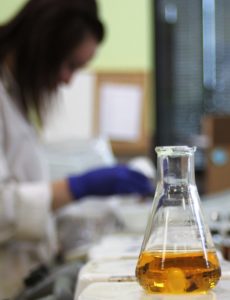
[Photo courtesy Flavorman]
First, the Flavorman project manager and the client discuss project parameters and regulatory needs. “Before we can begin developing a flavor, we need to take into account any label claims the customer wants to make,” Gibson says, such as “non-GMO” or “organic.” Retailers such as Trader Joe’s and Whole Foods also have their own requirements, so customers hoping to sell products through those outlets need to comply with their individual rules as well.
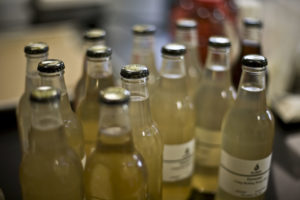
[Photo courtesy Flavorman]
Based on the client’s desired label declarations and flavor profile, Flavorman creates an initial round of samples for feedback. Often, the customer spends a day or two at Flavorman’s facility, working with beverage and flavor experts to create just the right profile. “We can try 100 different profiles and a multitude of different beverage bases in one day,” Gibson says. Once the ideal flavor is determined, Flavorman handles the final blending to create a finished beverage.
The cost for first-time product development with a full-service flavor company can range from $14,000 to $25,000, depending on the project.
Flavor Trends and Technology
With today’s emphasis on products made without synthetic or artificial ingredients, most alcohol beverage producers are looking for natural flavors. Extracting them from raw ingredients can be accomplished in various ways, from percolating them in a water solution to steam distillation. While flavorings are mainly sold in liquid form, Mother Murphy’s is currently researching spray dry equipment that will let the company convert liquids into powder form for easier shipping and longer shelf life.
Another step forward is the improved ability of scientists to identify and extract different flavor compounds. “In the past, all that was available to flavorists were essential oils, extracts, and a limited amount of aroma chemicals,” Gibson says. “Now companies have whole departments looking for these compounds—what makes a pomelo taste like a pomelo, or what makes a tangerine taste different than a navel orange.” Rather than creating a standard cherry flavor, companies are now able to offer cherry flavors at a varietal level, for example.
“The sheer multitude of aroma chemicals available now gives us far more paints to work with to create the final picture,” Gibson says. “We didn’t even know a lot of these compounds existed 10 years ago.”
Herbals and bitters currently top Flavorman’s most popular list, along with citrus and ginger. Flavored vodkas are on the decline, Gibson says, but flavored bourbons, rums, and tequilas are in demand.
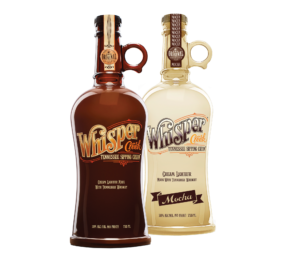
[Photo courtesy Pennington Distillery]
A look at Pennington Distilling Co.’s current product lineup provides a fascinating view into the world of flavored spirits. Along with the flagship Whisper Creek Tennessee Sipping Cream (original and mocha) Pickers Vodka and Davidson Reserve Whiskey, the company makes Pennington’s Rye Whiskey in strawberry, peach-apricot, and vanilla flavors.
“Some of the distillers are not into flavor because they want to make craft,” Murphy says. “However, from a business standpoint many customers have different needs and wants—especially if you operate out of a distillery and are doing tours. If you don’t have flavored products, you very much limit yourself.”
 SIDEBAR
SIDEBAR
A Proving Ground for New Drinks
Drinks entrepreneurs will soon have a new way to test market products while they’re still in the development process. Dubbed “The Lab,” the space will be a proving ground for beverage creators, as well as an interactive tasting venue for curious consumers. Created by Minnesota-based BevSource, a provider of beverage development services, The Lab is slated to open in St. Paul, Minn., in spring 2019.
![]() BevSource clients will be invited to showcase limited batches of beer, hard soda, and seltzers—all made onsite—along with tea, sparkling water, protein and energy drinks, and other beverages. The tasting room will feature self-serve taps with a range of rotating options for visitors to sample.
BevSource clients will be invited to showcase limited batches of beer, hard soda, and seltzers—all made onsite—along with tea, sparkling water, protein and energy drinks, and other beverages. The tasting room will feature self-serve taps with a range of rotating options for visitors to sample.
The Lab will also include a pilot production facility for beverage creators across the country to brew, ferment, and create prototypes, as well as refine recipes and formulas. Clients will have access to an onsite quality department with a full-service laboratory.
For more information, visit www.bevsource.com.

